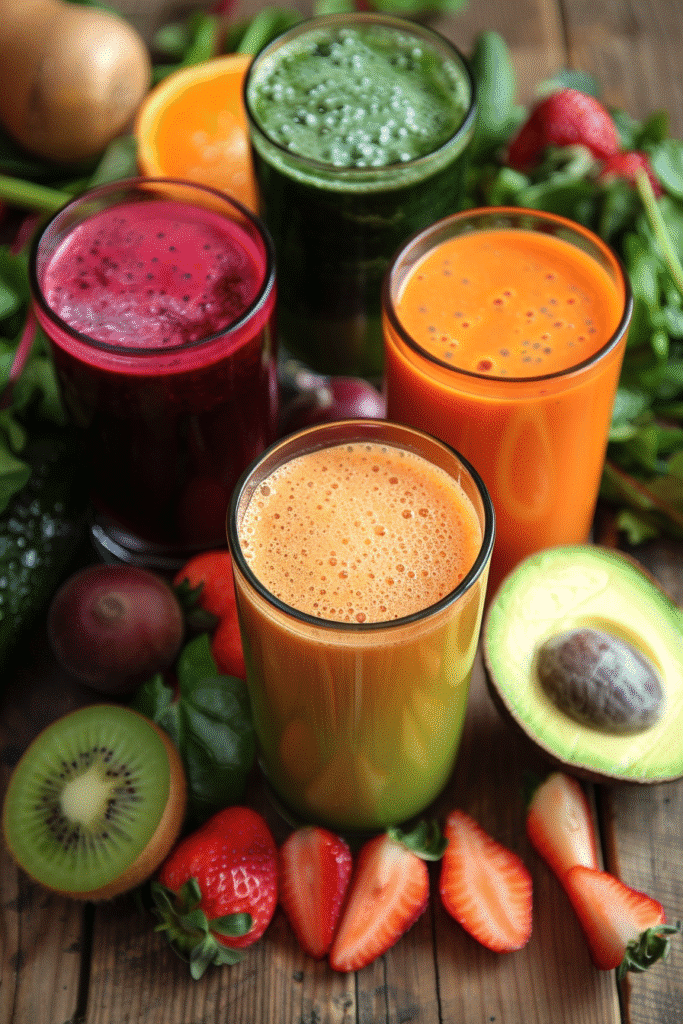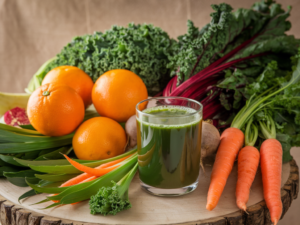
Juice fasting involves consuming only fresh juices from fruits and vegetables for a certain period. While the practice offers potential health benefits like detoxification and improved digestion, specific days during the fast can be particularly challenging due to physical and mental adjustments.
What is Hardest Days of a Juice Fast?
Definition and Types of Juice Fasts
Juice fasting is a short-term dietary practice where an individual replaces solid foods with freshly prepared juices. This practice is believed to help detoxify the body and reset digestive functions.
Common types of juice fasts include:
- Traditional Juice Fast: Consists of consuming only fruit and vegetable juices.
- Intermittent Juice Fast: Combines fasting intervals with juice consumption.
- Modified Juice Fast: Allows occasional inclusion of smoothies or plant-based supplements.
Health Benefits of Hardest Days of a Juice Fast
Juice fasting offers several potential health benefits that make it appealing for those looking to reset their bodies or enhance their wellness routines. Below are some of the most commonly cited advantages:
- Detoxification:
Juice fasting is believed to help the body flush out toxins by giving the digestive system a break and allowing organs like the liver and kidneys to focus on cleansing. - Boosted Energy Levels:
The influx of vitamins, minerals, and antioxidants from fresh juices can provide an energy boost, helping individuals feel revitalized even during the fast. - Improved Digestion:
By eliminating solid foods temporarily, juice fasting gives the digestive tract a rest, potentially reducing bloating and promoting gut health. - Increased Nutrient Absorption:
Juices are easily digested, which allows the body to quickly absorb nutrients without expending much energy. - Mental Clarity and Focus:
Many people report improved mental clarity and a sense of calm during a juice fast, likely due to reduced sugar and processed food intake.
The Timeline of Challenges During a Hardest Days of a Juice Fast

Day 1: Breaking Old Habits
The first day of a juice fast is often the most psychologically challenging. It involves stepping away from regular eating patterns, which can trigger cravings for comfort foods and habitual snacks. This phase requires strong mental resolve as you resist the temptation to eat solid foods.
Days 2-3: The Detox Phase
As the body begins detoxifying, you may experience physical symptoms such as fatigue, headaches, irritability, and even mild nausea. This is a normal part of the process as the body eliminates toxins and adjusts to the lack of solid food. Staying hydrated and getting enough rest can help mitigate these symptoms.
Days 4-5: The Plateau of Struggle
During this phase, while the physical symptoms may start to subside, emotional and mental challenges can persist. Many people experience moments of doubt, boredom, or frustration. Journaling about the experience or maintaining a checklist of progress can help maintain motivation and focus.
Day 6 and Beyond: Gaining Momentum

By this stage, many people notice a significant shift in their experience. Energy levels stabilize, cravings diminish, and a sense of accomplishment emerges. Positive physical changes, such as clearer skin or better digestion, often become evident, boosting morale and commitment.
Key Reasons Why These Days Are Difficult
Physical Detox Symptoms
The absence of solid food triggers a series of physical changes as the body transitions to using stored energy and begins detoxifying. Common detox symptoms include:
- Fatigue: Lower calorie intake may leave you feeling less energetic.
- Headaches: Often caused by reduced caffeine or sugar consumption.
- Digestive Changes: Mild bloating or irregular bowel movements as the body adjusts.
- Muscle Aches: A result of toxin release and electrolyte imbalances.
Solutions:
- Stay Hydrated: Drink plenty of water and herbal teas.
- Add Electrolytes: Incorporate coconut water or lightly salted juices.
- Rest: Prioritize sleep and avoid overexertion.
Psychological Challenges
Juice fasting isn’t just a physical challenge it’s a mental and emotional one as well. The absence of habitual eating patterns can cause:
- Cravings: Desire for comfort foods due to routine or emotional triggers.
- Mood Swings: Changes in blood sugar levels may impact emotions.
- Mental Fatigue: Adjusting to a different routine can feel overwhelming.
Solutions:
- Mindfulness Practices: Meditation and deep breathing can help manage cravings and mood.
- Distraction Techniques: Engage in non-food-related activities like reading or light exercise.
- Journaling: Writing about your progress and emotions can help maintain focus.
Strategies to Overcome Hardest Days of a Juice Fast Challenges
Staying Hydrated
While juice provides hydration, supplementing it with water is crucial during a fast to support detoxification and maintain optimal body function. Proper hydration helps alleviate headaches, flush toxins, and prevent fatigue.
Tips for Staying Hydrated:
- Alternate between juices and water throughout the day.
- Add a splash of lemon or cucumber to water for variety.
- Include herbal teas like peppermint or chamomile for additional soothing effects.

Managing Cravings and Hunger Pangs
Cravings and hunger pangs are common during a juice fast, especially in the initial days. Overcoming these requires both mental strategies and small adjustments to your routine.
Tips to Manage Cravings:
- Herbal Teas: Sipping warm herbal teas can provide a sense of fullness.
- Distractions: Engage in activities like reading, painting, or light cleaning to shift focus.
- Mindful Eating: Sip juices slowly, savoring each flavor to create a satisfying experience.
Incorporating Light Activities
Gentle physical activities can enhance mood, improve circulation, and help alleviate symptoms like restlessness or fatigue.
Recommended Activities:
- Yoga: Focus on restorative poses to relieve tension.
- Walking: A short walk outdoors can boost your energy and mental clarity.
- Stretching: Simple stretches can keep you feeling flexible and relaxed.
Journaling and Mindfulness Practices
Journaling is a powerful way to process emotions and stay motivated during a juice fast. Combining this with mindfulness practices can help you maintain a positive mindset.
Tips for Journaling:
- Write about your goals and progress each day.
- Document any physical or emotional changes.
- Reflect on the benefits you’re experiencing and challenges you’ve overcome.
Mindfulness Practices:
- Practice deep breathing exercises to reduce stress.
- Use guided meditations to center your thoughts.
FAQs About Hardest Days of a Juice Fast Challenges
Is it Normal to Feel Weak During a Juice Fast?
Yes, it’s normal to experience weakness or fatigue, especially in the initial days of a juice fast. This occurs as your body adjusts to a lower calorie intake and shifts from burning stored glucose to tapping into fat reserves for energy. Additionally, detoxification processes can temporarily drain your energy.
Tips to Manage Weakness:
- Stay Hydrated: Ensure you’re drinking plenty of water alongside your juices.
- Incorporate Light Juices: Opt for nutrient-dense juices with greens, citrus, or ginger for an energy boost.
- Rest When Needed: Listen to your body and take breaks or naps if necessary.
- Electrolyte Support: Include coconut water or a pinch of Himalayan salt in your juices to maintain electrolyte balance.
When to Be Concerned:
If weakness persists or worsens, or you experience dizziness, nausea, or fainting, consult a healthcare professional. It’s important to ensure the fast is safe for your individual health needs.
How Can I Handle Cravings for Solid Food?
Cravings for solid food are a common challenge during a juice fast, especially in the early days. Here are some actionable strategies to help you resist those temptations and stay on track:
Actionable Tips to Manage Cravings:
- Sip Slowly: Take small, mindful sips of your juice to prolong the experience and feel more satisfied.
- Snack on Juice-Friendly Ingredients: If the craving becomes overwhelming, blend a thicker juice or smoothie from juice-friendly ingredients (e.g., avocado, banana) as a last resort.
- Distract Yourself: Keep busy with non-food-related activities like reading, crafting, or taking a walk.
- Visualize Your Goals: Remind yourself of why you started the juice fast—better health, mental clarity, or detoxification—and focus on those benefits.
- Chew on Flavorful Items: If the act of chewing is what you miss, try chewing on sugar-free gum or sucking on a lemon wedge for a burst of flavor without breaking the fast.
- Prepare for Triggers: Avoid situations that might tempt you, such as being around foods that are difficult to resist.
Mindfulness Tip:
When cravings hit, pause and take a few deep breaths. Acknowledge the craving without judgment, then shift your focus to the vibrant nutrients you’re giving your body through the juice fast.
What Should I Do If I Feel Like Quitting?
Feeling like quitting during a juice fast is completely normal, especially when challenges like cravings or fatigue arise. Here are some motivation strategies and encouragement tips to help you stay committed:
1. Reflect on Your “Why”
Take a moment to remind yourself why you started the juice fast. Whether it’s for better health, mental clarity, or detoxification, reconnecting with your purpose can reignite your motivation.
2. Celebrate Small Wins
Acknowledge your progress so far, even if it’s just getting through one day. Create a simple progress chart or journal where you can track each day completed and jot down positive changes you’ve noticed.
3. Focus on the Benefits
Think about how your body is benefiting: detoxing, resting your digestive system, and receiving an abundance of nutrients. Visualize the positive outcomes waiting for you at the end of the fast.
4. Take It One Day (or Hour) at a Time
Break the fast into manageable chunks. Instead of thinking about how many days are left, focus on completing just one more meal or drink session.
5. Lean on Your Support System
If you have friends, family, or an online community supporting your journey, reach out for encouragement. Sharing your struggles can provide the boost you need to continue.
6. Adjust If Necessary
If the fast feels too overwhelming, consider modifying it slightly. For example, you could incorporate one small meal of raw vegetables or a smoothie to ease the transition without giving up completely.
7. Visualize the Finish Line
Picture yourself successfully completing the fast and how you’ll feel—proud, energized, and rejuvenated. Use this visualization as a source of inspiration.
Image Suggestion: A smiling person looking at a progress chart, with completed days marked off and a glass of juice in hand, symbolizing achievement and motivation.
Would you like help creating a customizable progress tracker or additional tips for staying motivated in challenging moments?
Healthy Green Juice
Equipment
- Juicer or Blender
- Knife & Cutting Board
- Juice strainer (if blending)
Ingredients
- 4 stalks celery leaves removed
- 2 green apples halved
- 1 cucumber
- 6 leaves kale
- 1/2 lemon peeled
- 1 in ginger root fresh piece
Instructions
- Wash all produce.
- Cut celery, apples, cucumber, kale into sizes for the juicer (or blender).
- Run everything except lemon through juicer.
- If using blender, blend with small amount of water, then strain.
- Add peeled lemon and ginger juice, stir and serve immediately.
Notes
Conclusion

Feeling the juice fast struggle? Follow me for more easy, uplifting ideas to power through your cleanse with flavor and ease! 💪🍋
Embracing the Juice Fast Journey
A juice fast is more than just a physical reset it’s an opportunity for self-discovery, discipline, and mindfulness. While the journey is not without its challenges, the rewards of improved health, increased energy, and mental clarity make it worthwhile.
Recap of Challenges and Benefits:
- Challenges: Detox symptoms, cravings, and emotional adjustments can be tough but are manageable with preparation and focus.
- Benefits: By powering through, you unlock benefits like detoxification, better digestion, radiant skin, and a renewed sense of vitality.
Encouraging Advice:
- Embrace each day as a step toward becoming the best version of yourself.
- Trust your body’s resilience and its ability to heal and adapt.
- Celebrate your progress, no matter how small, and keep your eyes on the ultimate goal of health and well-being.
Juice fasting isn’t just about what you’re giving up it’s about what you’re gaining: a stronger, healthier, and more vibrant you.
- Tropical Pineapple Salsa -Fresh, Flavorful, and Easy to Make
- Homemade Salsa for Canning – Honeybunch Hunts
- Easy Homemade Salsa Verde | Complete Guide
- Black Bean Corn Salsa – Fresh and Flavorful Recipe
- Pineapple Salsa That Wows at Every Party

